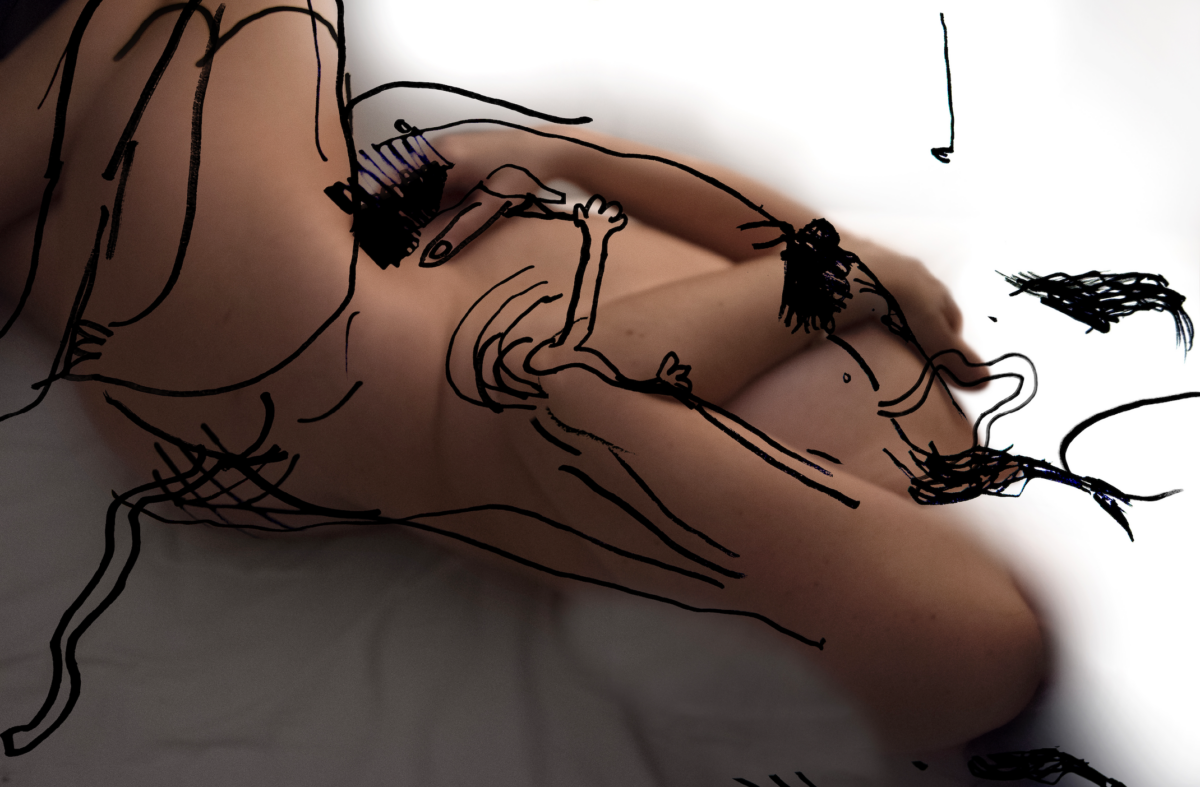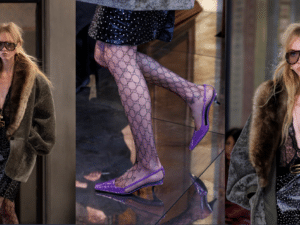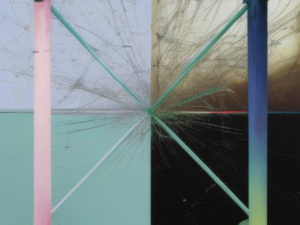In EX YOU, her exhibition at Fotografiska Berlin, Bosnian artist Šejla Kamerić explores themes of identity, memory, and resilience. Through poetic and often unsettling works, Kamerić confronts the lasting imprints of war, violence, and societal exclusion – always personal, always political. Known for her poignant reflections on the post-war generation of former Yugoslavia, Kamerić uses EX YOU to bring together pieces that challenge both collective and individual memory. Art historian Jasmina Tumbas offers an exclusive essay for Fräulein, providing critical insight into Kamerić’s practice – an invitation to reflect on the self in the shadow of history.
Disintegrating the Borders of the YU Self: Šejla Kamerić’s EX YOU at Fotografiska

EX YOU Fotografiska, by Šejla Kamerić
In a triptych of disjointed faces titled EX YOU PORTRAIT (2025) – made of messily overlapping black and white passport photographs of three generations of women – Šejla Kamerić tears through the membrane of individual identity and body power, disintegrating the borders of the self by way of emancipatory surrender to the strength of her female inheritance: daughter, mother, and grandmother are transfigured through the history of national death, migration, and diaspora.
While the traumatic breakdown of the territorial and ideological integrity of Socialist Yugoslavia looms large for all categorized as being from “Ex-Yugoslavia” since the 1990s, or what many scholars today refer to as the “Post-Yugoslav Space,” Kamerić reframes Yugoslav disintegration through corporeal hereditament and its gendered claims on the self in her new series of works for EX YOU exhibited at Fotografiska.
EX YOU forges a feminist rebuttal of the chauvinist term EXPAT – from the Latin ex + patria/patris – connoting the banishment from the fatherland. In its stead, EX YOU is a call to contend with the disintegrity of the female body and its attendant claim on national (un)belonging, exposing tensions embedded in the very term disintegration, semantically tied to the geo-political context of the 1990s Yugoslav wars and to all who survived – and who were “exed” during and after – the destruction of the multi-ethnic, socialist country.
Bearing in mind that the preposition “EX” connotes “former” (Ex-Yugoslavia/former Yugoslavia), as well as “out” or “outside of,” or “removed,” the conceptual strength of EX YOU is amplified by complicating to what or to whom the EX might refer in each iteration of Kamerić’s series: in another triptych, EX YOU BODY, a collaborative work between the artist and her daughter, Ela Rosa, the nine-year old took and manipulated photographs of Kamerić’s naked torso, arms, and legs, marking the parts of her mother’s body she felt (still) belong to her, such as the breasts that nourished her as an infant, or the belly from which she sprang.
An etymological accomplice to “EX,” the artist’s “offspring” is now “outside
of” her mother, but simultaneously also a “former” part of her body. EX YOU BODY (2) reminds us that the corporeal disintegration of the mother’s womb from the newborn – most explicitly visible in the cut of the umbilical cord – is the necessary condition for exiting the mother’s body. Pregnancy and the act of giving birth decimate the fraught integrity of the female body, manifest in the unique corporeal bond between mother and daughter. Ela Rosa’s claim over her mother’s body – however playful and lovingly yielded as artistic medium for their collaboration – recasts possession as a form of (self)love. In the expressed rationale behind her artistic decisions for EX YOU BODY, the daughter notes (paraphrased by Kamerić): “I came from your tummy… I was feeding from your breast, [so] I can take and draw on these nice parts of your body. I can also add new ones, which gives your body more power.” (3) Here, the taking and giving with negotiated consent becomes an artwork that advances a feminist reclamation of the disintegrated female body and her offspring.
Centering feminist kinship, Kamerić resists the categorization of “EX-YU” (former Yugoslav) throughout the entire EX YOU series. While two of the illuminated EX YOU TXT MESSAGES posit the artist’s daughter as the “Future YOU,” and the (grand)mother (Kamerić’s mother) as “Ex YOU” (the artist is her mother’s “offspring”), a third declares Kamerić as the only “YU” (Yugoslav, or Jugoslovenka). And yet, the homophonic abbreviation “YU” is phonetically identical to “YOU,” thereby de-solidifying the expected authority of the pronoun (Ex-YU and EX YOU sound the same but mean different things). This conceptual intervention by the artist antagonizes the integrity of language and betrays its inevitable inaccuracy.
How many died in the Yugoslav wars because their identities were held captive by, and were reduced to, a single ethnic category imposed by nationalist decrees? Can a prefix – such as in the commonly used wording “Ex-Yugoslavia” – expel the socialist country’s history of multi-ethnic unity, transnational solidarity, and anti-fascist resistance? Kamerić insists on the fact that Yugoslavia (YU) is more than the collapse of its parts (Ex-YU), stressing her unique connection to Yugoslavia (“ONLY ME IS YU”). Until recently, Kamerić lived and worked in Berlin as a foreigner and member of the Yugoslav diaspora, navigating pressures to integrate in a new national context while enduring social forces of assimilation that seek to absorb, reconcile, and obscure difference. Deliberately overstretching the elasticity between YU and YOU, the artist repeatedly undermines the authority of verbal and visual capture.

EX YOU Fotografiska, by Šejla Kamerić
Visually disintegrating the cohesion of each face, Kamerić’s transgenerational EX YOU PORTRAIT emerges as an antidote against biometric capture, refusing a government-mandated system of identification designed to monitor and control the movement of bodies across national borders. As Somali-British poet Warsan Shire noted in a different, diasporic and transnational context of besieged women:
"You desperately want to look like her [your mother]. You look nothing like your mother. You look everything like your mother. […] Your mother is a woman and women like her cannot be contained.” (4)
EX YOU PORTRAIT is transnational at its core, for each protagonist beneath the obfuscation was born in the same region, but technically in a different country, given various historical challenges related to questions of “territorial integrity.” In the context of nationalism, integrity is defined by gendered notions of cohesion, such as relying on the moral belief that national traditions and order will keep a country and its people safe, and sane. EX YOU disintegrates national-patriarchal authority and its claims to absolute moral integrity: masked by dogmatic conviction, patriarchal nationalism succumbs to the weight of its own inadequacy. As we witness time and again, women and children are condemned to absorb the destruction caused by its ill-fated logic.
The inclusion of Kamerić’s Bosnian Girl in EX YOU introduces another “portrait” that is simultaneously of one (herself) and of many (icon): “Bosnian girls” came face to face with the “unfinished sympathy” of their perpetrators and rescuers, who were – and still are – sometimes one and the same. (5) Here it is important to remember that to capture also means to “absorb,” or, “to take into one’s possession or control by force.” (6) This logic buttressed the ethnic cleansing and gendered violence on behalf of the (new) fatherland(s) emerging out of the Yugoslav wars; it also included politically punitive sexual torture of Bosnian women – held captive en masse in rape camps – leaving survivors with the weight of carrying out forced pregnancies. While Bosnian Girl is a portrait of countless survivors whose corporeal integrity was shattered – unprotected during the war and denigrated by a world that failed to shield them – the sleek Calvin Klein style photograph of Kamerić behind the UNPROFOR graffiti rebuts expectations of anguish with the artist’s impenetrable nerve.
EX YOU intentionally maneuvers the remedial power of art by extending its literal and figurative reach beyond the enclosed walls of individual experience. (7) Kamerić’s exegesis of feminist kinship foregrounds intimate connections that mark the transnational migratory passages for women, be it familial or by way of shared – and related – experiences. (8) Feminist solidarity, friendship, and love are the necessary, mutable components of the self that propel collective defiance of patriarchal capture. BAGGAGE (Lullaby for Natalija P.) invites viewers to recalibrate their bodies against the punctured phantasmagoria of prescribed girl/ womanhood. The three passport photos in EX YOU, with which I began my essay, bare visual kinship with a set of photographs for Kamerić’s series Mother Is a Bitch (2022) shot by the late feminist photographer, Goranka Matić, a close friend of the artist who passed away recently. These three imprecisely overlapping close-up portraits of Kamerić elude the integrity of her visage, conferring the legacy of their artistic collaboration on three generations of women who merge into (n)one. EX YOU asks us to surrender to this possibility of shared strength. Disarming a dreaded object used to sort who is permitted or denied entry at the border, Kamerić offers us a FREE pass, or a path to be FREE, converting an instrument used to harden boundaries into a tool for disintegrating them.
Notes
1 Šejla Kamerić in conversation with the author,
January 22, 2025.
2 The word “offspring” is related to the Old English
“ofspring,” meaning to spring off (away from).
Oxford English Dictionary Online.
3 Kamerić in conversation with the author.
4 Warsan Shire, How to Wear Your Mother’s Lipstick,
featured in Beyonce’s Lemonade (2016).
5 Massive Attack’s song Unfinished Sympathy was released
in 1991, during the Gulf War. The BBC promptly declared
that the band name is “unpatriotic.” The record industry
pressured the band to be temporarily renamed “Massive.”
The Yugoslav wars would escalate in the years to come
shortly after. The notion of disintegration is present here
too: “Like a soul without a mind, in a body without a heart,
I am missing every part.”
6 See Oxford English Dictionary Online.
7 The word “extend” derives its meaning from the Latin,
“extendere,” meaning to “stretch (tendere) out (ex).”
The word experience comes from the Latin word
“experientia,” meaning “test (peritus) + out (ex).” Ibid.
8 “Exegesis” has Greek origins in “exēgēsis,” meaning
interpret, or “out of (ex) + guide, lead (hegeisthai).” Ibid.
Šejla Kamerić EX YOU
April 25 – August 17, 2025
Monday – Sunday, 10:00 AM – 11:00 PM



